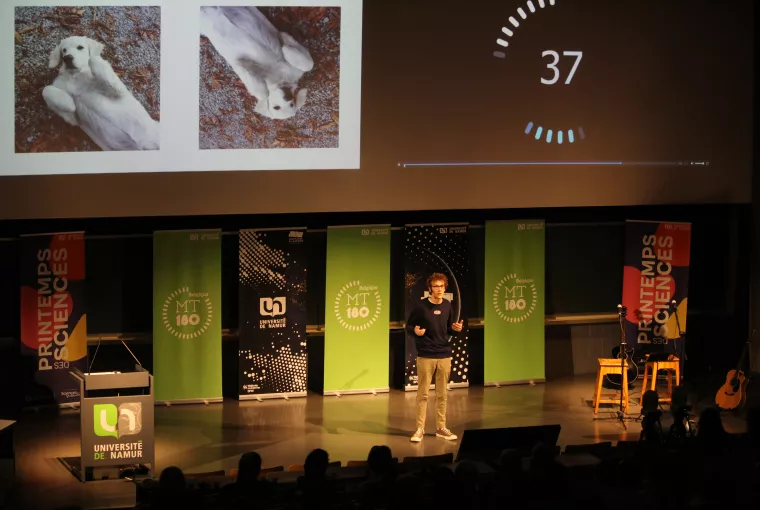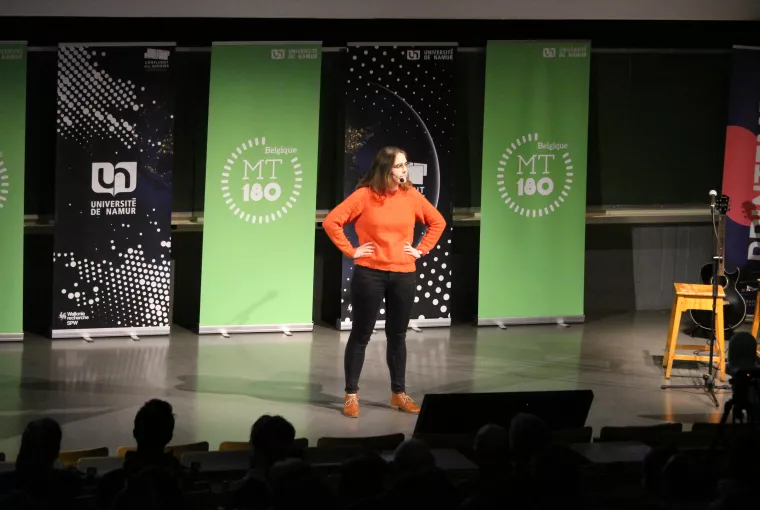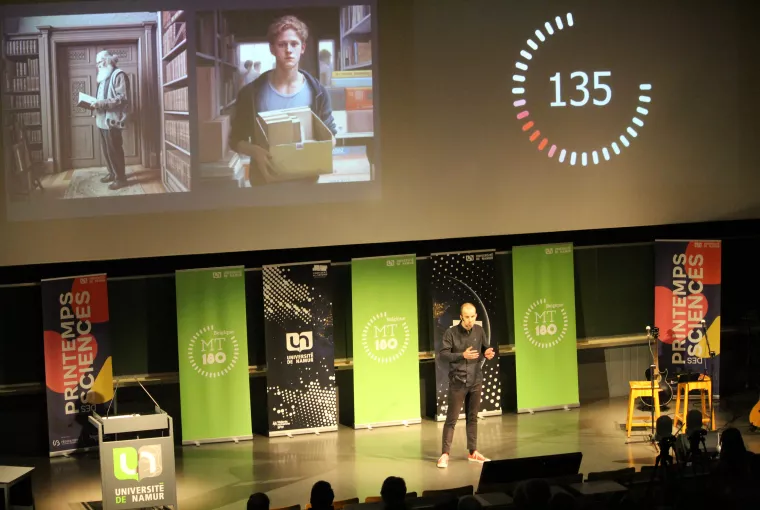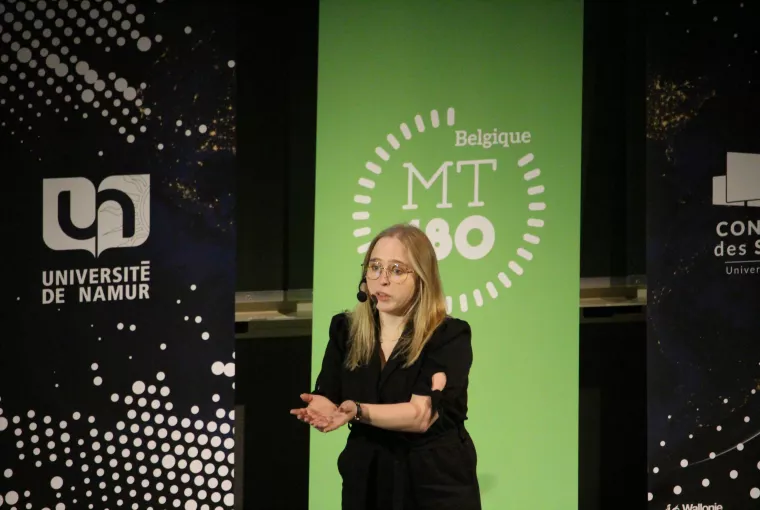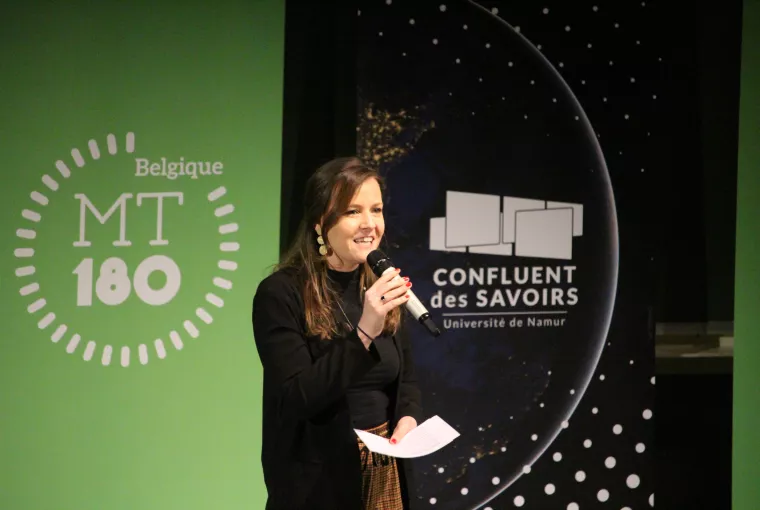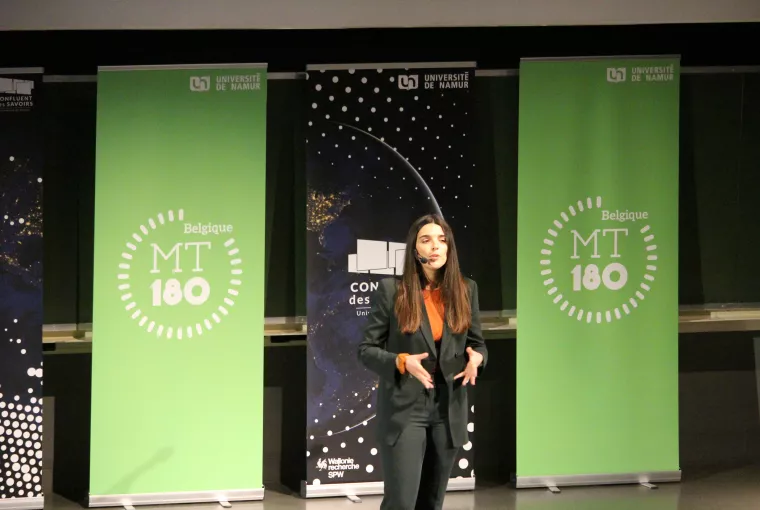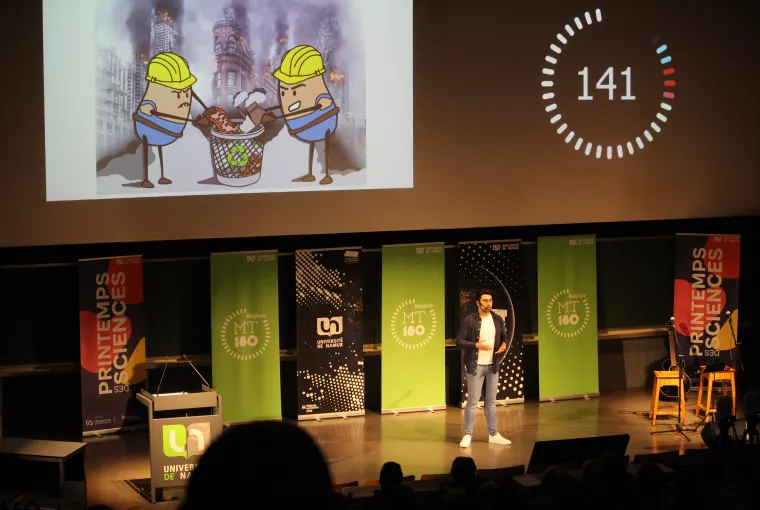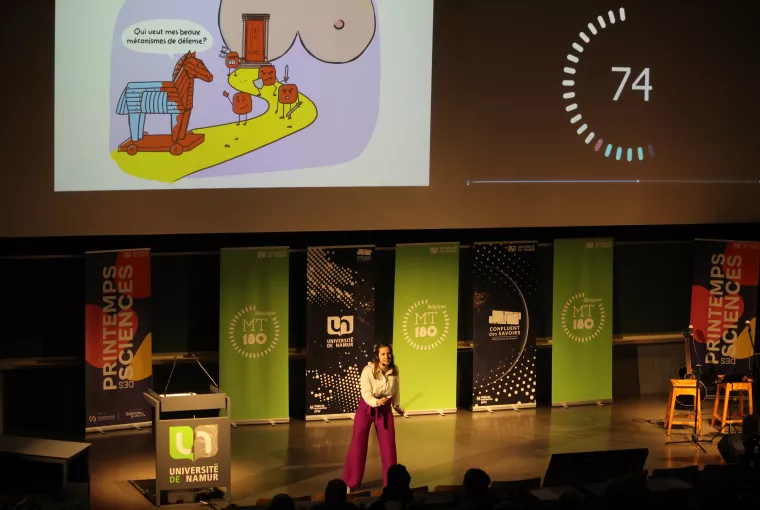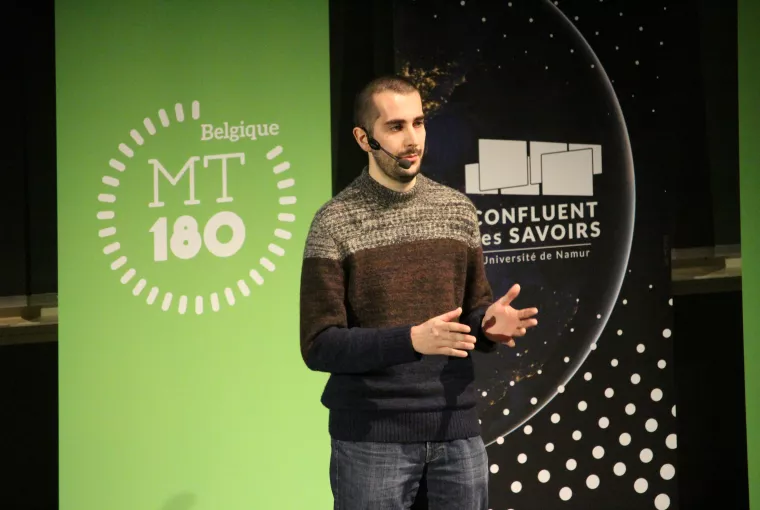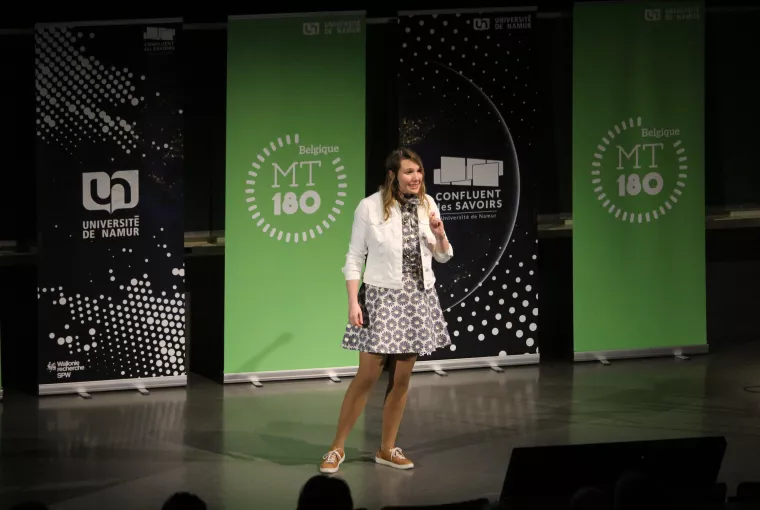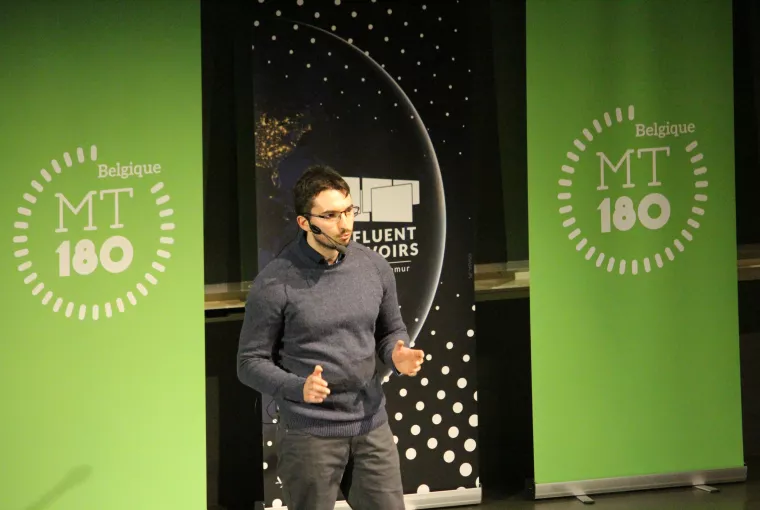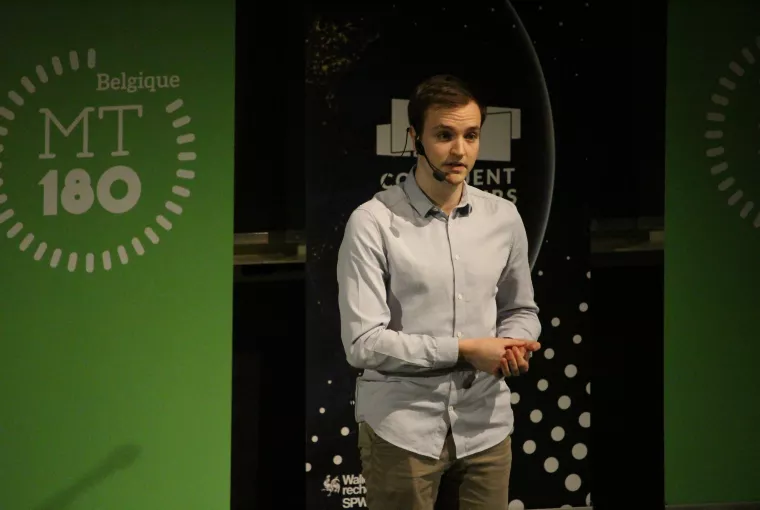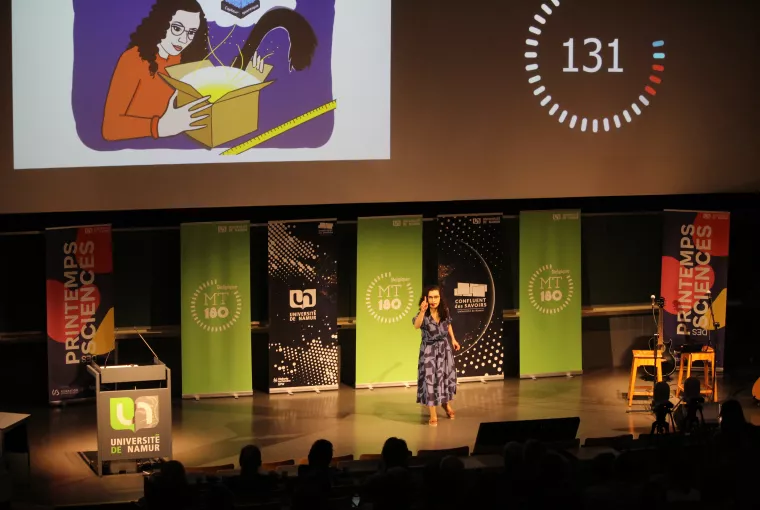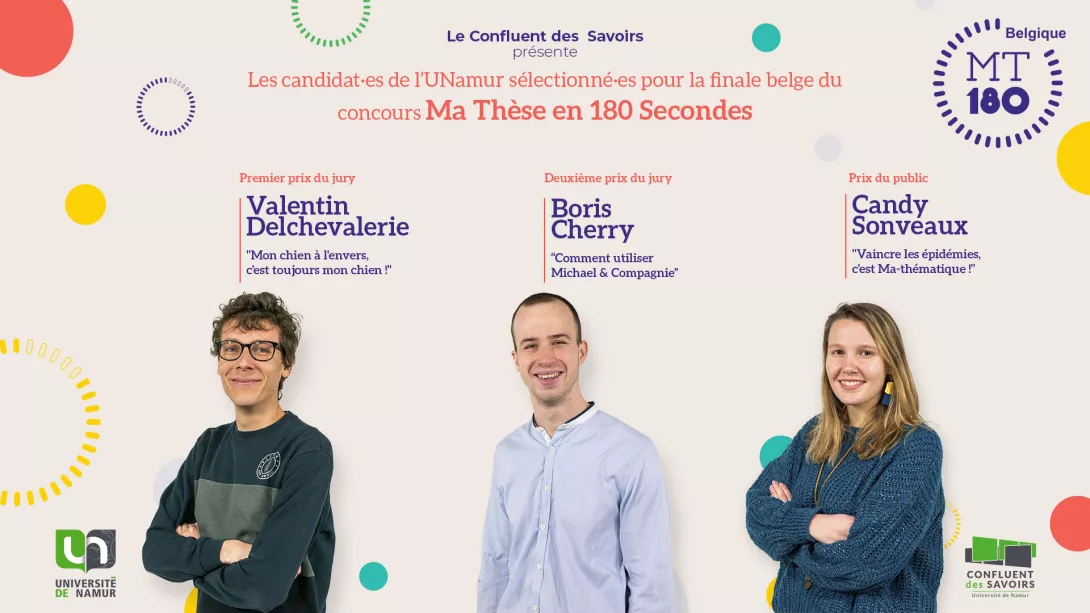
The public prize was awarded to Candy Sonveaux for her pitch "La vaccination c'est Ma-thématique". The second jury prize, the creativity prize offered by TRAKK by KIKK asbl, was awarded to Boris Cherry for his pitch "How to use Michael and Company". The first prize of the jury was awarded to Valentin Delchevalerie for his pitch "Mon chien à l'envers, c'est toujours mon chien!
The regional competition is the first step in the MT180 adventure. The three winners from Namur will represent UNamur at the national final on 2 June in Louvain-la-Neuve. The winner will represent Belgium this autumn at the international final in Rabat, Morocco.
The 2023 candidates
- Aline Bodson (Law),
- Giacomo Lopopolo (Physics),
- Eléonore Hardy (Biology),
- Antoine Sion (Computer Science),
- Candy Sonveaux (Mathematics),
- Guillaume Maître (Computer Science),
- Lucas Shoenauen (Physics),
- Lorena Ballesteros Ferraz (Physics),
- Valentin Delchevalerie (Computer Science),
- Jelena Luyts (Geography),
- Boris Cherry (Computer Science)
- Dr. Manon Mirgaux (Chemistry).
Their presentations were enthusiastically received by the audience: 280 people gathered in the Pedro Arrupe Auditorium to discover the current state of interdisciplinary research and its societal challenges. In order to prepare them optimally for the requirements of the competition and those of their thesis or conference presentation, the candidates received training in popularised communication, the construction of a structured pitch, as well as appropriate speaking and body language. The candidates' pitches were evaluated by a jury of experts. The candidates' pitches were evaluated by a jury of professionals in the field of communication and popularisation of science in the STEAM field: Géraldine Tran, editor-in-chief of Athena, the SPW's scientific magazine; Nathan Uyttendaele, statistician and web populariser via his YouTube channel "Chat Sceptique"; Charlotte Benedetti, director of the Pavillon (KIKK asbl) in Namur, and François-Xavier Fiévez, pedagogue, didactician and improviser, Vice-Rector for Student and Social Affairs at the UNamur.
Interview with the winners, by Aline Wilmet, scientific mediator at the Confluent des Savoirs
What convinced you to participate in the MT180 adventure?
Valentin Delchevalerie
I heard about the competition a long time ago and I always wanted to take part, but only after I had progressed in my research to get a global view of it. I never talked about my work in my private circle, so my goal was to be able to popularise it enough to talk about my thesis to my friends and family.
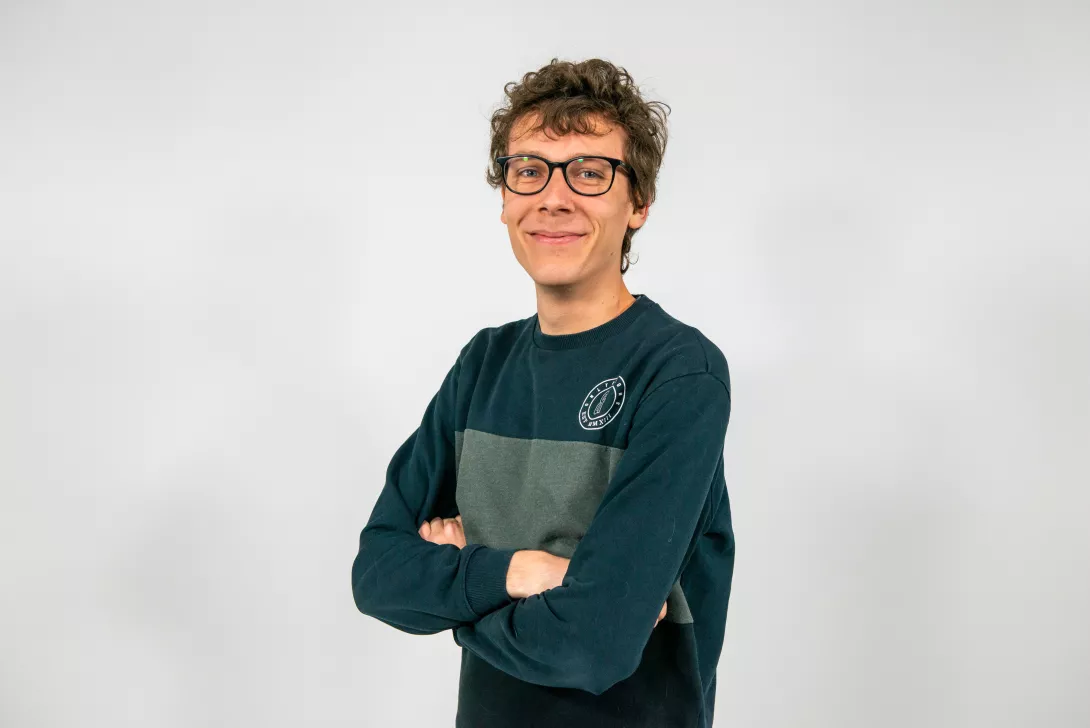
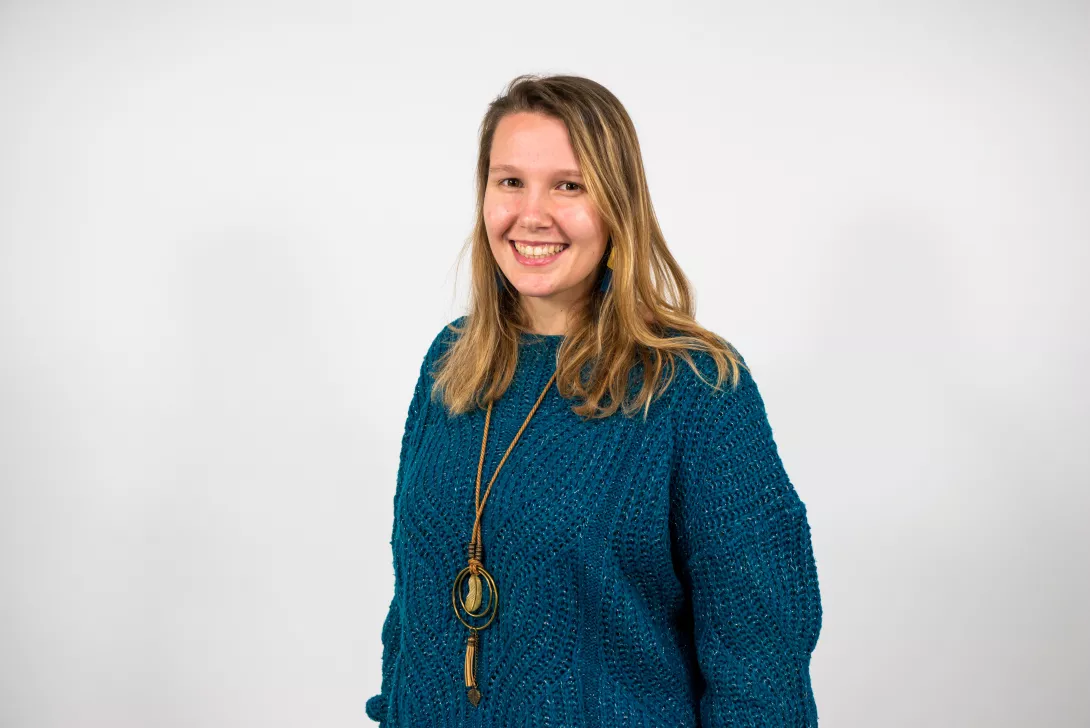
Candy Sonveaux
My goal is to communicate to as many people as possible that mathematics is useful. Paradoxically, I never talked about my research because I have a rather strong impostor syndrome. But I dared to embark on the MT180 adventure because the approach serves societal issues. I've been doing my thesis for five years now: I can now clearly see the purpose of my research and I'm more comfortable explaining it.
Boris Cherry
I discovered the competition a very long time ago and by chance when I was looking for videos to watch to fill the long boat rides on the game Sea of Thieves. Several people in my family have done theses. My sister and I challenged each other to enter the contest. I also learned that participation was valued as part of the doctoral training and that the candidates benefited from quite extensive training. This motivated me because I had the feeling that it was going to be very difficult to construct a 3-minute pitch that would be understandable and faithful to my research. When I saw that other colleagues in the Faculty of Computer Science were taking part, it convinced me to go for it.
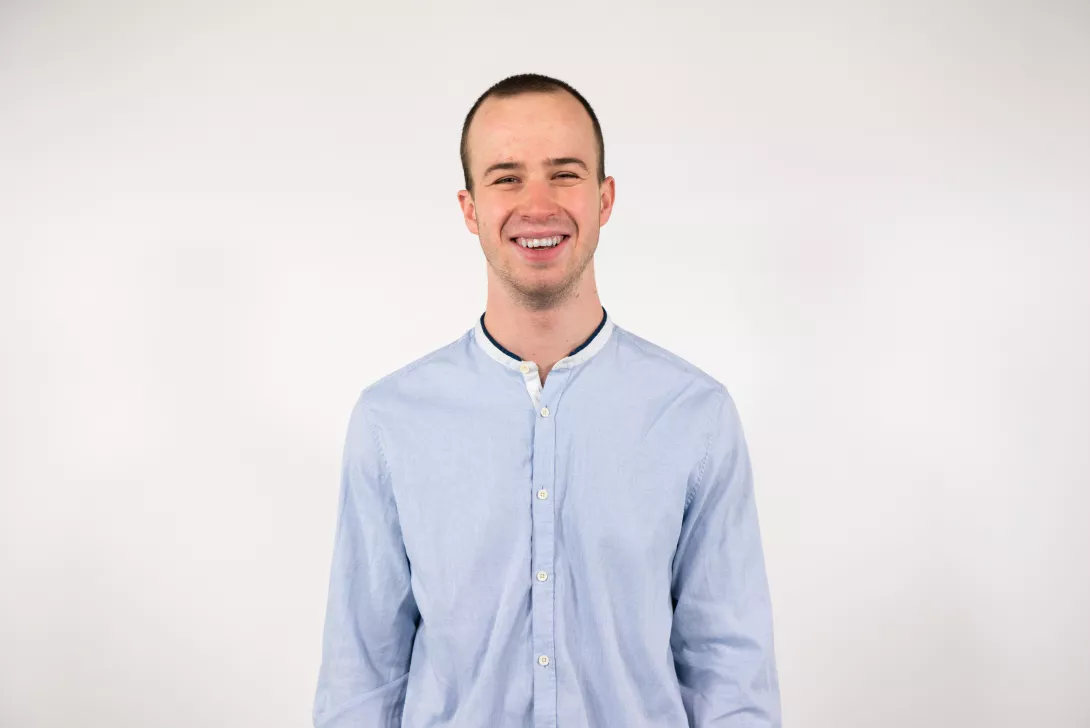
Taking part in MT180 means learning to popularise, but also to express yourself in front of an audience, to find a good balance in your acting, to embody in your body language and your speech all the interest you have in your research. Do you have to be extroverted or have stage experience to participate in this competition?
Candy: Not at all. The experience is all the more enriching if you have not mastered the tricks of the trade, how to captivate an audience, how to set your voice, how to manage your body language... You learn everything in the course.
Boris: There are always participants who are more at ease than others, but we have all evolved and benefited from the coaching to improve our performance.
Valentin: Your personality is reflected in the style of your presentation and that's what makes it unique. Come as you are!
Do you think the MT180 competition plays an important role in the dissemination of scientific knowledge?
V: MT180 can be seen by some as a show, but this more playful format has the advantage of attracting the public. As the candidates' profiles are varied, a multitude of subjects can be covered in one evening.
B: It's a gateway, a way to discover research in its entirety.
C: One of the strengths of the competition is indeed the plurality of profiles both among the candidates and the public. They would probably never have come to listen to me talk about maths in a one-hour conference. It's a great opportunity to capture their curiosity and interest. What's more, the popularisation doesn't stop at the presentation during the competition, as our pitches are the sub
Three minutes to talk about your research is very short. Inevitably, you have to make choices about what to say. Did you feel that you were betraying your research?
V: One of the first training courses introduced mind mapping to help us structure our pitch. At that point, I felt a little frustrated, because I would have liked to be able to say more. I had a precise plan in mind and I realised that this plan could not be communicated in three minutes and that I would have to make choices. The aim is for people to understand what is at stake in this research.
B: In three minutes, you obviously can't go into all the subtleties of your work. You have to accept that you have to put aside certain aspects. I was a bit frustrated not to be able to talk about my day-to-day work, but I made this choice in favour of communicating a more general objective: I wanted the audience to feel that they had understood the overall purpose of my research. For that, there is no need to go into detail.
C: My promoter, who is passionate about mathematical formalism, told me "what you say in your pitch is really what you do". This helped me to feel more legitimate in my presentation. The objective is to communicate globally and simply about what you do in your thesis, without lying. For the anecdote, I presented my pitch to the first year undergraduate students in maths and physics by drawing a parallel with what I write about my thesis in a scientific article. Thanks to this method, they discovered that research is not fragmented, that disciplines interact with each other. It is also a good opportunity to introduce students to the method of writing a scientific article as early as possible in their training.
What do you take away from the MT180 experience?
V: I had underestimated the work involved in designing a 180-second thesis pitch. The training sessions organised around the competition were very stimulating and helped me in this work. The tools I discovered there will be useful for the rest of my life.
C: I was expecting training in popularisation and I wanted to challenge myself. I came out of this experience with an original training that goes against the grain of theoretical training, in action and doing, which allows me to perform better when speaking and to manage my stress better. During the competition, I really enjoyed communicating and did not feel any anxiety. I have evolved a lot during this adventure: there will really be a before and after to MT180 in my speeches. You work a lot for the competition, you make a lot of effort... along the way, you say to yourself that it would be nice to win with all that you have invested, but in the end, at the end of the course, I have gained friendly relations with the other candidates and a useful toolbox for the future.
B: Before I signed up, I expected to have three or four trainings and rehearsals, and basta... I didn't really have any expectations, I was curious. What I got out of it was really useful training and intensive coaching. We started to work actively very early and we refined our presentation right up to the end with the coaches. On the day of the competition, I didn't want to mess up, I wanted people to get on board with me, to laugh. It worked and I was very happy with my performance. I didn't expect to receive the creativity award and to represent UNamur at the national final!
Did this experience make you want to do more outreach and participate in other science dissemination events?
C: I am passionate about this exchange with others, so it is only natural for me to continue in this direction. Thanks to this training and the collaboration with the Confluent des Savoirs, I can do it in a legitimate way. It takes time, but as it is a passion, I want to take it.
B: Communicating about one's research is one of the societal missions of a researcher, but it is also the one that is least valued in this field. It's a lot of work and it's sometimes difficult to find time to do popularisation in parallel with research.
V : Naturally, I won't take the initiative to set up a popular science project: it's a big investment to produce something qualitative. However, if I am invited to participate in a project, I will get involved, because it is one of our duties as researchers.
